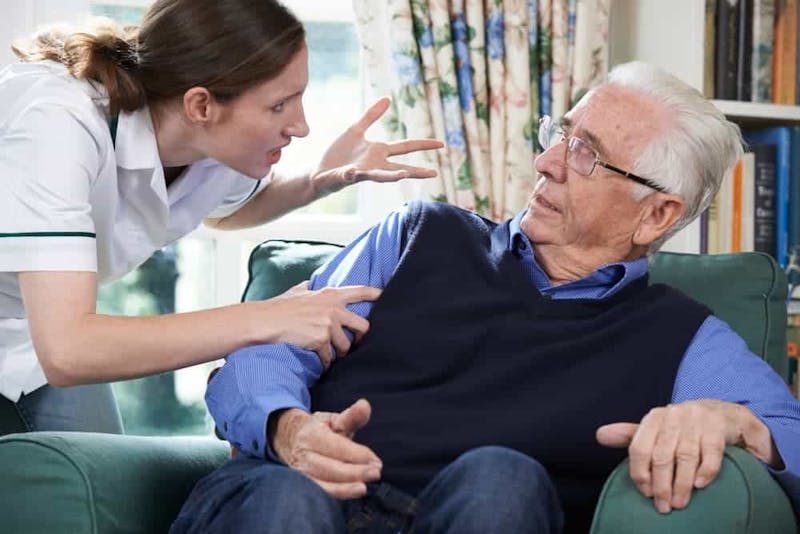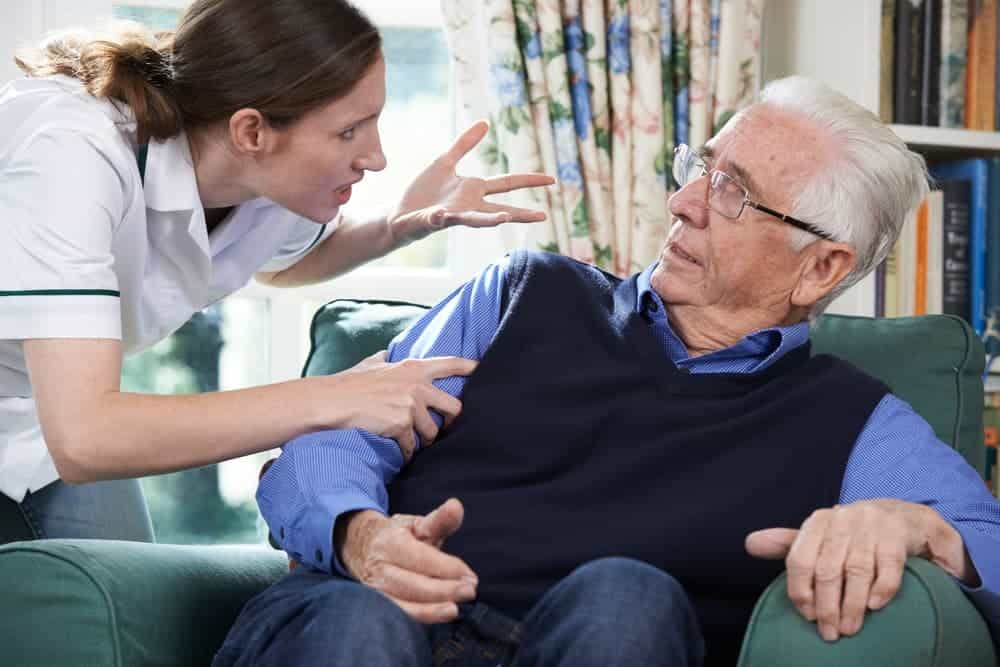
Abuse and negligence at nursing homes are all too common. One in 10 Americans aged 60 or older has experienced some form of elder abuse—and only one in 14 have reported it to the authorities. Nursing home abuse happens frequently but, unfortunately, goes unnoticed.
Washington’s Vulnerable Adult Protection Act frees all nursing home residents from “verbal, sexual, physical, and mental abuse, corporal punishment, and involuntary seclusion.”
You may file a claim with the nursing home’s insurance company or file a lawsuit if a nursing home abused or neglected you or a family member. A nursing home abuse lawyer can hold the responsible parties accountable, secure justice for you and your loved one, and recover the compensation needed to treat the injuries the nursing home and its staff caused.
What to Do When Your Loved One Experiences Nursing Home Abuse
If your loved one shows sudden personality changes, becomes withdrawn, or loses significant weight, the nursing home may have neglected or abused them.

You may notice other signs of neglect or abuse:
- Regressive habits like sucking their thumb or rocking back and forth
- Sudden change in appetite
- Signs of malnutrition or dehydration
- Their medication is out of order
- They’re missing their glasses or cane
- The care facility might prohibit you from seeing them without notice
- Unexplained injuries
- Financial transactions that are out of the ordinary
Nursing home abuse in Washington is common and can occur in several forms —physically, emotionally, sexually, financially, or as neglect and abandonment. Although you put your trust in a residential care facility to see to your loved one’s needs, you should stay vigilant for signs of abuse.
If you suspect someone at the nursing home has abused your family member, there are several options you can use to stop it.
Call 911
If the nursing home has put your loved one in immediate danger, call 911 and report it. Your family member can get emergency medical treatment or have the police remove them from a harmful situation. Calling 911 also provides a paper trail for the investigation that might follow.
Call the Washington DSHS
Washington’s Department of Social and Health Services (DSHS) has an adult protection services department. They take reports of suspected nursing home abuse via an online form. DSHS can investigate the matter and help you take further action if needed. You can also call the state hotline 1-866-END-HARM.
Contact a Nursing Home Abuse Lawyer
Filing a report and calling an insurance carrier are big steps, but you want a lawyer to complete these tasks for you. If you don’t have experience dealing with nursing homes or insurance companies, your nursing home abuse lawyer can guide you. They can also help you investigate the abuse your loved one suffered. Most importantly, a nursing home abuse lawyer can help you and your family members seek compensation for their damages.
File a Report With the Nursing Home
If your loved one isn’t in immediate danger, but you still believe the nursing home abused them, your lawyer can submit a report to the nursing home’s administrators. They may escalate it to the company that runs the nursing home or report it to a licensing agency, such as the state medical board. In Washington, you can check the credentials of any healthcare provider on the state government’s website.
Call the Insurance Company
Your lawyer can call the insurance company that insures the nursing home and file a claim for abuse against your loved one. The facility’s insurer probably covers these claims. The insurance carrier may settle with you to avoid a lawsuit—but it’s difficult to know if the settlement will pay for all of your injuries until a nursing home lawyer evaluates it.
Filing a Lawsuit for Nursing Home Abuse
You may need to file a lawsuit if you cannot get adequate compensation from the insurance company.
For your claim to succeed, you’ll have to prove that the abuse occurred.
Washington’s Aging and Long Term Support Administration (ALTSA) recognizes the following types of abuse:
- Physical abuse: Intentional bodily injury such as slapping, pinching, choking, kicking, or inappropriately using drugs or physical restraints
- Sexual abuse: Nonconsensual sexual contact such as wanted touching, rape, sodomy, or coerced nudity
- Mental or emotional abuse: Deliberately causing mental or emotional pain such as intimidation, coercion, harassment, isolation, or treating an adult like a child
- Exploitation: Improperly using another adult for profit or gain, such as illegally withdrawing money from their account, forging checks, or stealing things from them
- Neglect: Depriving a vulnerable adult of the care necessary to maintain their physical or mental health, such as not providing basic food, water, clothing, housing, medicine, or health care
- Abandonment: Leaving a vulnerable adult without the ability to obtain necessary food, clothing, shelter, or health care, such as leaving a vulnerable adult in a public place or at home without access to basic life necessities
To prove the nursing home caused the abuse, you’ll have to gather evidence showing the facility had a duty of care to your loved one and that they neglected this duty of care.
Your personal injury attorney can gather this evidence:
- Your loved one’s nursing home records (which you can obtain via Medicaid or Medicare)
- Medical records
- Photographs of your loved one’s physical injuries or living situation
- Formal complaints filed against the nursing home previously
- Statements from witnesses
- Past inspection reports from the ALTSA
- Checking the nursing home’s state license to operate
You typically file a claim for nursing home abuse with the insurance company that insures the nursing home.
Who you file a lawsuit with will depend on:
- The individual nursing home staff member responsible for the abuse
- Nursing home supervisors who knew about the abuse or who hired the individual responsible for the abuse
- The company that owns or operates the nursing home
The victim must file the lawsuit in a nursing home abuse case. You or a family member can’t do it for them unless they’ve given you power of attorney.
A personal injury attorney can file a claim or a lawsuit for nursing home abuse. They’ll know which evidence is important. An attorney can also handle the rest of the process, such as filing all the paperwork, negotiating with the insurance company, researching your case, and representing you in court if your case goes to trial.
How Are Nursing Home Abuse Settlements Calculated?
The amount of compensation you get from a nursing home settlement depends on several factors. In a claim or lawsuit like this, the victim usually gets paid for damages they’ve suffered. Damages can be physical injury, financial losses, or pain and suffering.
Damages can be economic or non-economic. Economic damages are pretty easy to calculate because there’s already a dollar figure attached.
Examples of typical economic damages in a nursing home abuse case are:
- Medical bills
- Relocation costs (if you removed your loved one from one nursing home and transferred them to another as a result of the abuse they suffered)
- Physical therapy or rehabilitation
- Counseling or mental health therapy
- Reimbursement for lost property or lost funds
Non-economic damages are more difficult to calculate because they don’t already have specific amounts associated with them, like medical bills.
But a nursing home abuse attorney can still determine how much non-economic damages are worth:
- Pain and suffering
- Loss of consortium/companionship or parent-child relationship
- Damage to quality of life
Depending on the nature of the case, the settlement might be paid out as a lump sum or in smaller installments over time.
How Much Is a Nursing Home Abuse Case Worth?
Past nursing home abuse cases have awarded the plaintiff (victim) hundreds of thousands or even a million dollars—but it depends significantly on the nature of your case.
The factors that help determine the value of a nursing home abuse case are:
- How much compensation you think is fair for your loved one’s suffering
- How much the defendant in the case can pay
- The strength of your argument and evidence
- The amount awarded to victims in similar cases
Most cases settle before they reach court. Having the case go to court can take a long time, and the other party may want to take care of the matter sooner rather than later. However, you shouldn’t just accept the first settlement offer that comes your way.
You have to know if the compensation they offered will cover the damages your loved one suffered. If they have physical injuries that require hospitalization and months of physical therapy, for example, they’ll need a way to pay for all of those expenses. A settlement package can cover those costs.
You’ll want someone on your side who understands how to calculate damages and how to negotiate with an insurance company. Your nursing home abuse attorney can demand the proper amount of compensation and even represent you in front of a judge if your case goes to trial.
Collecting on a Nursing Home Abuse Claim
After you reach a settlement with the other party for a nursing home abuse claim or lawsuit, your loved one doesn’t get the money right away. Typically, your attorney must pay all outstanding medical bills, liens, and case expenses (including your attorney’s contingency fees) before they can disburse the rest of the money.
Are Nursing Home Abuse Settlements Taxed?
Typically, the IRS does not tax personal injury awards. If the nursing home abuse resulted in a wrongful death case, the settlement would go to the plaintiff’s heirs or become part of their estate. The IRS may not tax this money, either, but you will want to consult an accountant or tax attorney to assess your situation.
If the victim of the nursing abuse is no longer alive to collect the settlement and didn’t leave a will, you may have to hire a probate attorney to determine what happens with the settlement money.
Find Out What Your Nursing Home Abuse Case Is Worth

If you want to know whether you have a case, contact a personal injury attorney to deal with this difficult situation and provide the legal guidance and support you need.












